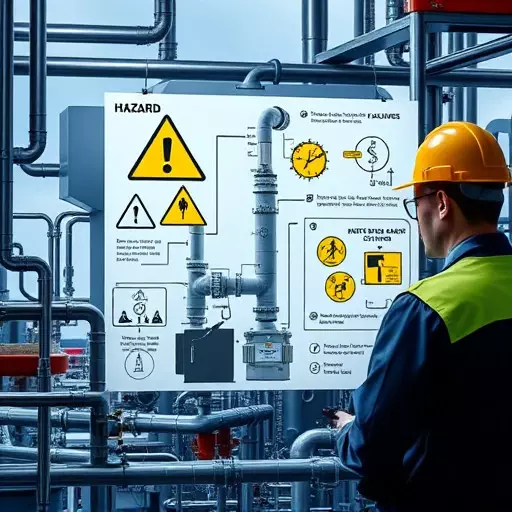Process Safety Management Consulting leverages advanced hazard identification techniques like Process Hazard Analysis (PHA) to uncover potential risks in complex industrial processes. They meticulously evaluate systems, integrate best practices, and recommend improvements for enhanced process safety culture and risk mitigation. This collaborative approach, utilizing process hazard analysis, fosters a proactive safety environment by learning from incidents and improving overall process reliability.
In the dynamic landscape of industrial processes, incidents can serve as powerful teachers. “Lessons Learned from Process Incidents” explores how understanding and leveraging these events can significantly enhance process safety. From establishing a robust foundation through incident analysis to employing advanced hazard identification techniques and conducting comprehensive Process Hazard Analyses (PHAs), this article offers insights into effective process safety management consulting. Discover key lessons from real-world incidents and explore preventive measures that underscore the importance of proactive process safety strategies.
- Understanding Process Incidents: A Foundation for Learning
- The Role of Process Safety Management Consulting in Incident Analysis
- Uncovering Hazards: Effective Hazard Identification Techniques
- Deep Dive: Conducting a Comprehensive Process Hazard Analysis (PHA)
- Key Lessons and Recommendations from Real-World Incidents
- Preventive Measures: Implementing Solutions for Enhanced Process Safety
Understanding Process Incidents: A Foundation for Learning

Process incidents, whether minor or major, serve as critical learning opportunities within industrial operations. To fully comprehend their impact and prevent recurrence, organizations must delve into a structured understanding of these events. A robust foundation for this learning process begins with comprehensive hazard identification techniques, enabling experts to uncover potential risks hidden within complex processes. By employing advanced methods such as process hazard analysis (PHA), consulting firms specializing in process safety management can facilitate thorough investigations.
These analyses go beyond surface-level observation, scrutinizing intricate interconnections and variable conditions that contribute to incidents. Through meticulous PHA, underlying factors are exposed, providing insights into the nuances of process dynamics. Armed with this knowledge, organizations can implement proactive measures, enhancing overall process safety and ensuring lessons learned from incidents resonate across operations.
The Role of Process Safety Management Consulting in Incident Analysis

Process Safety Management Consulting plays a pivotal role in incident analysis, offering expertise and structured approaches to uncover the root causes behind process-related incidents. These consultants employ advanced hazard identification techniques, including Process Hazard Analysis (PHA), to systematically evaluate complex industrial processes and identify potential risks. By conducting thorough PHAs, they help organizations quantify and qualify hazards, ensuring that safety measures are tailored to specific risks.
Through their involvement, consulting firms provide valuable insights into industry best practices, facilitating continuous improvement in process safety culture. They assist in implementing effective risk mitigation strategies, promoting a proactive approach to safety management. This collaborative effort between organizations and consultants fosters a safer working environment by learning from incidents and enhancing overall process reliability.
Uncovering Hazards: Effective Hazard Identification Techniques

Uncovering hazards is a critical step in ensuring process safety management consulting. Effective hazard identification techniques, such as Process Hazard Analysis (PHA), play a pivotal role in identifying potential risks within industrial processes. PHA involves a systematic approach to evaluate and prioritize hazards by examining process flows, equipment, and potential failure modes. This method not only helps in understanding the nature of hazardous events but also allows for the development of robust risk mitigation strategies.
By employing advanced hazard identification techniques, organizations can uncover latent risks that might otherwise go unnoticed. These techniques encourage a comprehensive review of all aspects related to a process, enabling professionals to identify and address potential safety concerns proactively. Such proactive measures are essential in mitigating catastrophic events and ensuring the overall integrity of industrial operations.
Deep Dive: Conducting a Comprehensive Process Hazard Analysis (PHA)

A Deep Dive into Conducting a Comprehensive Process Hazard Analysis (PHA) is an essential step in enhancing process safety management, especially for industries dealing with complex and high-risk processes. PHA serves as a robust tool to identify potential hazards and assess their impacts, enabling consultants and industry professionals to implement effective risk mitigation strategies. By employing advanced hazard identification techniques, this meticulous analysis goes beyond surface-level assessments, delving into the intricate details of process systems.
The process begins with gathering detailed information about the facility, its operations, and relevant safety data. Various methods, including checklists, interviews, and historical incident reviews, are utilized to uncover potential hazards. Once identified, these hazards are systematically analyzed, considering their likelihood and consequences. This involves assessing the severity of accidents, evaluating human factors, and determining the effectiveness of existing control measures. The outcome provides a clear roadmap for process safety consultants to recommend improvements, ensuring a safer working environment and minimizing potential risks.
Key Lessons and Recommendations from Real-World Incidents

Real-world process incidents offer invaluable insights and serve as critical learning opportunities for enhancing process safety management consulting. By meticulously examining these events, organizations can uncover key lessons and implement effective recommendations to mitigate risks. One of the primary takeaways is the importance of robust hazard identification techniques. These techniques, such as the Process Hazard Analysis (PHA), play a pivotal role in uncovering potential hazards that might be overlooked during initial assessments.
Furthermore, incidents highlight the need for comprehensive risk assessment methods. PHAs, when conducted rigorously, enable professionals to identify and prioritize risks, develop control strategies, and implement robust safety measures. By integrating these lessons into their practices, process industries can foster a culture of proactive safety management, ensuring that potential hazards are addressed before they escalate into significant incidents.
Preventive Measures: Implementing Solutions for Enhanced Process Safety

Preventive measures play a pivotal role in enhancing process safety, especially after incidents that could have been avoided. A comprehensive approach involves utilizing proven techniques like hazard identification and carefully conducting Process Hazard Analysis (PHA). These methods ensure that potential risks are uncovered and addressed proactively. By systematically evaluating processes and systems, companies can implement tailored solutions to mitigate hazards, thereby reducing the likelihood of future incidents.
Process Safety Management consulting firms offer valuable expertise in guiding organizations through this process. They assist in adopting best practices, developing robust safety protocols, and training personnel on hazard recognition and control. Integrating these measures into daily operations creates a culture of awareness and proactive risk management, ultimately fostering a safer working environment.


